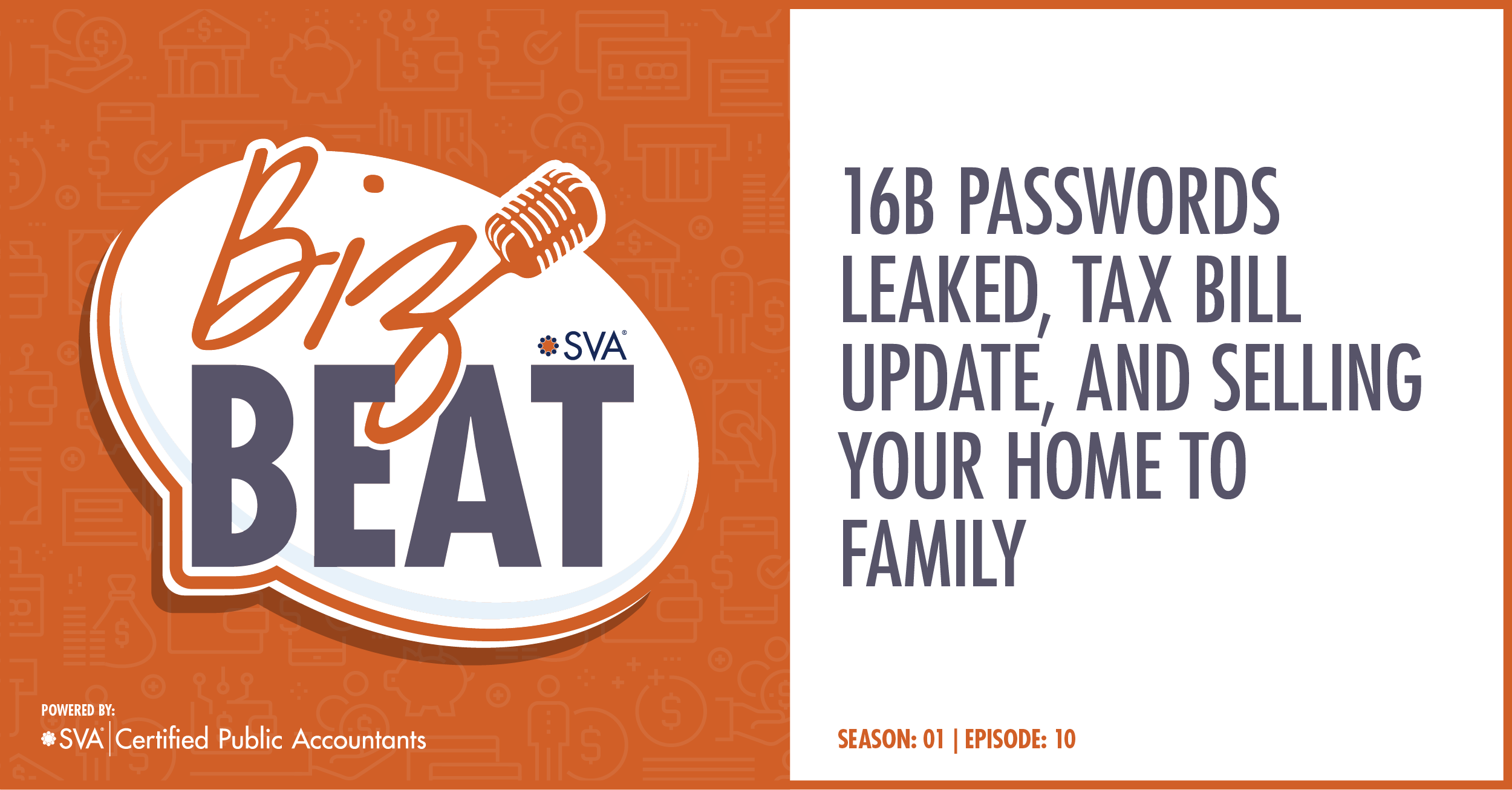| Highlights: |
- The article covers a major cybersecurity breach involving 16 billion leaked passwords and explains the heightened risks for individuals and businesses.
- It provides an update on recent tax legislation developments and outlines potential impacts on taxpayers and planning considerations.
- The post also discusses financial and tax considerations when selling a home to a family member, including valuation, gift tax, and compliance issues.
|
In a week packed with cybersecurity headlines and tax policy updates, there’s a lot for business owners to keep an eye on.
A staggering 16 billion usernames and passwords were recently exposed in a wide-ranging data breach, raising fresh concerns about online security.
At the same time, the Senate is still working through its version of a proposed tax bill, and it could have significant implications for businesses if passed.
And on the tax planning front, we answer the question: can you still claim the capital gain exclusion on your home if you sell it to a family member? The answer might surprise you.
Let’s break down each of these developments and what they mean for business owners.
(Download Video Transcript)
16 Billion Passwords Leaked: What It Means for Your Business
A breach involving 16 billion usernames and passwords is hard to wrap your head around. That’s nearly twice the population of the planet. And this wasn’t just one isolated incident. It was a collection of breached data from multiple sources, compiled into one massive dataset now reportedly circulating on the dark web.
For business owners, the takeaway is clear: this kind of exposure puts nearly everyone at risk. Even if your systems weren’t directly breached, your login credentials could still be in that mix. And if you or your employees reuse passwords across platforms, the danger only multiplies.
What Can You Do?
| Change Passwords Regularly |
It’s a hassle, sure. But those forced password changes? They serve a purpose. |
| Use Unique Passwords for Each Account |
Consider a password manager to keep them organized. |
| Check with Your Insurance Broker About Cybersecurity Coverage |
Not all policies are created equal, and if you're ever the target of a ransomware attack, you’ll want that protection in place. |
| Have Backup Systems and Protect Those Backups |
Some ransomware attacks specifically target and wipe backups, making recovery difficult or even impossible without a payout. |
If a breach does occur, recovery is rarely simple. Companies that fall victim to ransomware often face encrypted data, deleted backups, and demands for payment, often calculated based on how much attackers believe your business can afford. Even with insurance, the process can be costly and stressful.
The bottom line: don’t wait for something to happen before putting safeguards in place.
The Senate Tax Bill: Still Stuck, Still in Play
While cybersecurity dominated headlines, tax legislation continued inching its way through Congress. The House has already passed a version of the bill, but the Senate’s version is still in limbo. There were hopes for a vote by the end of the week, with added pressure from President Trump to get it done before the July 4th holiday.
That timeline is looking ambitious. The Senate still needs to resolve internal disagreements before it can pass its version, and once it does, the bill will have to go back to the House for approval. Only then can it head to the President’s desk.
It’s a complex process, and there’s no guarantee it will wrap up quickly. For business owners, that means continued uncertainty, but also an opportunity to stay informed and ready to act once the final details emerge.
Can You Still Claim the Home Sale Exclusion If You Sell to a Family Member?
A common tax planning question came up this week: if you sell your home to your child, can you still claim the capital gain exclusion?
In most cases, yes.
The home sale exclusion allows homeowners to exclude up to $250,000 of capital gains ($500,000 if married) when selling a primary residence, provided they’ve lived in the home for two of the past five years. That exclusion still applies even if you sell to a family member, so long as the sale is conducted at fair market value.
This strategy can open the door for some creative (but legitimate) planning between generations, especially with home values rising significantly over the past several years. There are limits (you can’t use the exclusion more than once every two years, and the property must qualify as a primary residence), but selling to a child doesn’t automatically disqualify you from the benefit.
It’s a reminder that even seemingly simple transactions can come with tax advantages if handled correctly.
Keep Up With What's Happening
Between cybersecurity threats, tax policy changes, and lesser-known tax rules, there’s a lot for business owners to stay on top of right now. If you're not sure whether your business is protected from data breaches, or how new tax laws might affect you, now’s a good time to have those conversations with your advisor.
After all, being proactive is often the best defense.
Stay Ahead with The Biz Beat
Want more insights like these? The Biz Beat by SVA is your weekly go-to source for practical tax and business advice.
Subscribe on Apple Podcasts, Spotify, or YouTube.
Submit questions at sva.com/bizbeat
© 2025 SVA Certified Public Accountants

